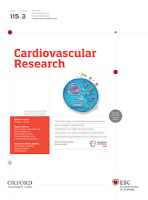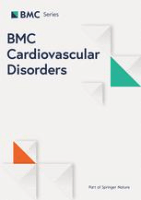
Lymphatic Research and Biology
Scope & Guideline
Pioneering insights into lymphatic function and cardiovascular medicine.
Introduction
Aims and Scopes
- Lymphedema Diagnosis and Assessment:
The journal emphasizes the development and evaluation of diagnostic tools and assessment methods for lymphedema, including advanced imaging techniques and subjective symptom evaluation. - Surgical and Non-Surgical Treatment Modalities:
Research on various treatment strategies, including surgical interventions like lymphovenous anastomosis and non-surgical approaches such as complex decongestive therapy, is a core focus. - Impact of Comorbidities and Psychological Factors:
Studies exploring how comorbidities, psychological impacts, and quality of life relate to lymphedema are prominently featured, highlighting the need for holistic patient management. - Innovations in Lymphatic Research:
The journal encourages innovative research in lymphatic biology, including studies on lymphangiogenesis, genetic factors influencing lymphedema, and novel therapeutic approaches. - Interdisciplinary Approaches:
Emphasizing a multidisciplinary perspective, the journal promotes collaboration among clinicians, researchers, and therapists to enhance the understanding and treatment of lymphatic disorders.
Trending and Emerging
- Digital Health Interventions:
There is a growing trend towards digital health solutions for lymphedema management, including mobile applications and telehealth approaches that enhance patient engagement and monitoring. - Personalized Treatment Approaches:
Emerging research emphasizes personalized treatment plans based on genetic, phenotypic, and psychosocial factors affecting individual patient responses to therapies. - Psychosocial Impact and Quality of Life:
The exploration of psychosocial factors and their impact on quality of life in lymphedema patients is gaining traction, acknowledging the importance of mental health in chronic disease management. - Innovative Imaging Techniques:
The use of advanced imaging technologies, such as three-dimensional ultrasound and bioimpedance spectroscopy, for precise diagnosis and monitoring of lymphedema is increasingly prominent. - Lipedema Research:
Research focusing on lipedema, particularly its relationship with lymphedema and its unique treatment challenges, is emerging as a significant area of interest.
Declining or Waning
- Lymphatic Filariasis:
Research on lymphatic filariasis has decreased, possibly due to a global shift in focus towards more prevalent and manageable conditions like lymphedema post-cancer treatment. - Traditional Compression Therapy Techniques:
While still important, conventional methods of compression therapy are receiving less attention as newer, more innovative techniques and technologies gain traction in the treatment landscape. - Basic Histopathological Studies:
There is a noticeable decline in basic histopathological studies as the journal increasingly prioritizes clinical outcomes and intervention studies over foundational research. - Lymphatic Anatomy Studies:
Research strictly focused on anatomical studies of lymphatic vessels has waned, with more emphasis now placed on functional studies and clinical applications. - General Edema Research:
The broader category of edema research, which includes conditions outside of lymphedema, is less frequently published, as the journal narrows its focus to specific lymphatic disorders.
Similar Journals

LYMPHOLOGY
Championing empirical research for clinical excellence.LYMPHOLOGY is a distinguished journal dedicated to the study of lymphatic biology, hematology, and immunology, published by the esteemed LYMPHOLOGY organization since its inception in 1968. As a key resource within the scientific community, it holds a notable place in the academic landscape with a 2023 Scopus ranking of #47 in Hematology and #120 in Immunology and Allergy, reflecting its commitment to advancing knowledge through empirical research and critical reviews. Although it is not an Open Access journal, its relevance is underlined by a Q3 category in both hematology and immunology, providing a platform for groundbreaking research that addresses key challenges in these fields. Researchers and professionals will find invaluable insights and innovative methodologies within its pages, reinforcing its role as a vital contributor to advancing scientific understanding and clinical practice in lymphology and related disciplines.

Dementia and Geriatric Cognitive Disorders Extra
Transforming research into accessible knowledge for all.Dementia and Geriatric Cognitive Disorders Extra, published by KARGER in Switzerland, is an esteemed open-access journal dedicated to advancing research in the fields of cognitive neuroscience, geriatrics, and psychiatry. With a commitment to disseminating high-quality research since its inception in 2011, the journal plays a crucial role in highlighting innovative studies that address cognitive disorders associated with aging. As an open-access platform, it ensures that findings are accessible to a global audience, fostering collaboration and knowledge-sharing among researchers, professionals, and students alike. The journal has been recognized for its impact in Cognitive Neuroscience and Psychiatry and Mental Health, achieving a Q3 category ranking, indicating its reputable standing within these fields. By delivering cutting-edge insights and promoting interdisciplinary approaches, Dementia and Geriatric Cognitive Disorders Extra is instrumental in enhancing understanding and treatment of cognitive decline, making it a vital resource for anyone engaged in the study of aging and cognitive health.

Acta Epileptologica
Advancing epilepsy research for a brighter tomorrow.Acta Epileptologica is a prominent open-access journal published by SPRINGERNATURE, dedicated to advancing research in the fields of neurology and clinical neurology. With its ISSN 2096-9384 and E-ISSN 2524-4434, this journal has established itself as a key resource for researchers and practitioners worldwide, particularly since its transition to open access in 2019. Based in the United Kingdom, Acta Epileptologica aims to disseminate high-quality research and foster scholarly collaboration, as evidenced by its consistent Q3 ranking in both neurology and clinical neurology categories as of 2023. Although currently positioned in the lower percentiles on Scopus, the journal plays a critical role in exploring emerging trends and novel therapeutic approaches in epilepsy research, making it an essential platform for academics, healthcare professionals, and students deeply invested in the evolving landscape of neurological disorders.

Cardiology and Therapy
Leading the way in cardiology research and innovation.Cardiology and Therapy, published by SPRINGER LONDON LTD, is a leading open-access journal dedicated to advancing the field of cardiology and cardiovascular medicine. With an ISSN of 2193-8261 and an E-ISSN of 2193-6544, this esteemed journal has been at the forefront of disseminating high-quality research since its inception in 2012. It has achieved an impressive Q1 ranking in the 2023 Cardiology and Cardiovascular Medicine category, reflecting its commitment to excellence and relevance in the field. Spanning a wide array of topics—from clinical studies to cutting-edge therapeutic interventions—the journal aims to foster knowledge exchange among researchers, clinicians, and healthcare professionals. In addition, its position in the 72nd percentile of Scopus rankings underscores its global impact and contribution to the cardiovascular research community. With open access options, Cardiology and Therapy ensures that its content is widely accessible, promoting the sharing of vital findings that can influence clinical practice and improve patient outcomes.

ARTERIOSCLEROSIS THROMBOSIS AND VASCULAR BIOLOGY
Pioneering insights into thrombosis and vascular disorders.ARTERIOSCLEROSIS THROMBOSIS AND VASCULAR BIOLOGY, published by Lippincott Williams & Wilkins, is a leading journal in the field of cardiovascular medicine, dedicated to the advancement of research surrounding arterial diseases, thrombosis, and vascular biology. With an impressive impact factor indicative of its reach and influence, this journal occupies a prominent position in the Q1 category of cardiology, ranking 13th out of 387 in its field according to Scopus, placing it within the top 96th percentile among cardiovascular research journals. Since its inception in 1990, ARTERIOSCLEROSIS THROMBOSIS AND VASCULAR BIOLOGY has been pivotal in disseminating cutting-edge research that drives innovation and education in cardiovascular health. Although it does not operate under an open access model, the journal is a vital resource for researchers, clinicians, and students looking for high-quality, peer-reviewed articles that contribute to the understanding and treatment of cardiovascular and vascular disorders. Its commitment to rigorous scientific standards and its focus on impactful findings make it an essential publication for anyone dedicated to the field.

PHLEBOLOGIE
Transforming Vascular Insights into Clinical PracticePHLEBOLOGIE is an esteemed journal published by GEORG THIEME VERLAG KG, serving as a critical platform for the dissemination of research in the field of Cardiology and Cardiovascular Medicine. Since its inception in 1991, the journal has consistently provided a comprehensive range of articles that explore the complexities of vascular health, offering insights into innovative treatments, diagnostic advancements, and emerging trends. Although currently not available as an Open Access publication, PHLEBOLOGIE maintains an impactful presence in the academic community, evident in its 2023 Scopus ranking as Q3 within its category and a percentile standing of 25%. Residing in Germany, PHLEBOLOGIE aims to bridge the gap between research and practice, appealing to researchers, clinicians, and students alike by fostering a deeper understanding of vascular conditions and their management.

International Journal of Sports Physical Therapy
Fostering collaboration for optimal recovery outcomes.Welcome to the International Journal of Sports Physical Therapy, a premier platform dedicated to advancing the field of sports therapy and rehabilitation. Published by the NORTH AMER SPORTS MEDICINE INST-NASMI, this open access journal has been vital in disseminating state-of-the-art research since its inception in 2011. With an ISSN of 2159-2896, it boasts a commendable standing within the academic community, achieving a Q2 ranking in 2023 across multiple categories, including Orthopedics and Sports Medicine, Physical Therapy, and Rehabilitation. Spanning diverse topics relevant to sports physical therapy, this journal serves as an invaluable resource for researchers, clinicians, and students alike, promoting best practices and innovative techniques in the field. By maintaining a commitment to high-quality peer-reviewed content, it not only contributes significantly to the existing body of knowledge but also fosters collaboration among professionals seeking to enhance patient care and rehabilitation outcomes.

Phlebolymphology
Unveiling the complexities of venous and lymphatic interactions.Phlebolymphology is a pivotal academic journal dedicated to advancing the field of vascular medicine, focusing on the intricate relationship between the venous and lymphatic systems. Published by Laboratoires Servier, this journal has been a significant platform for disseminating high-quality research and clinical findings since its inception in 1996, with coverage having extended from 1998 to 2017. Although it has discontinued its presence in Scopus, the journal remains a respected source within the realms of cardiology and cardiovascular medicine, currently ranked in the 19th percentile among its peers. While Phlebolymphology does not offer open access, its contributions are essential for practitioners, researchers, and educators looking to deepen their understanding of vascular diseases and treatments. With a commitment to promoting innovative research and clinical insights, Phlebolymphology plays an important role in shaping health care practices relating to venous and lymphatic health.

CARDIOVASCULAR RESEARCH
Exploring the complexities of cardiovascular health.CARDIOVASCULAR RESEARCH, published by Oxford University Press, is a premier academic journal dedicated to the evolving field of cardiology and cardiovascular medicine. With a remarkable impact factor reflecting its significant contribution to the scientific community, this journal maintains a Q1 ranking in both Cardiology and Physiology categories, demonstrating its commitment to publishing high-quality research that influences clinical practices and healthcare outcomes. Established in 1967, the journal has consistently provided a platform for innovative studies and reviews, aiming to advance our understanding of cardiovascular physiology and pathology. Researchers, professionals, and students will find published articles crucial for their work, as the journal covers a broad spectrum of topics including molecular biology, genetics, and clinical studies. While currently not offering open access options, CARDIOVASCULAR RESEARCH remains accessible through institutional and individual subscriptions, ensuring that the latest findings are available to those in the cardiovascular science community.

BMC Cardiovascular Disorders
Advancing knowledge in cardiovascular health.BMC Cardiovascular Disorders is a premier open access journal dedicated to the field of cardiology and cardiovascular medicine, published by BMC, a leading publisher in the scientific community. Since its inception in 2001, this journal has provided a platform for high-quality research, showcasing innovative studies and critical reviews that contribute to the understanding and management of cardiovascular diseases. With an impressive impact factor and a rank in the Q2 category for 2023 within its field, BMC Cardiovascular Disorders stands at the forefront of cardiovascular research, enabling accessibility to a wealth of information that fosters collaboration and advancements in patient care. The journal's commitment to open access ensures that research is widely disseminated and easily accessible to researchers, practitioners, and students globally, enhancing the dialogue around cardiovascular health and disease prevention. Located in the United Kingdom, BMC Cardiovascular Disorders consistently aims to promote excellence in the study and treatment of cardiovascular conditions, encouraging the exchange of knowledge that ultimately benefits public health.